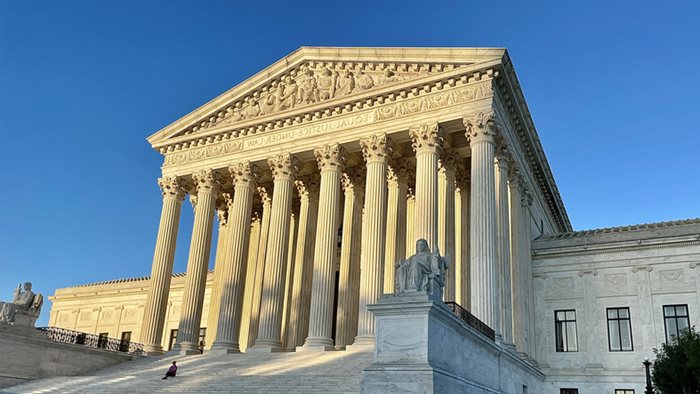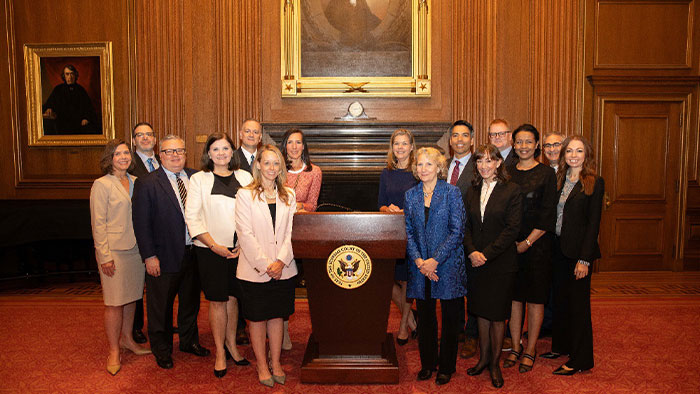Key Court Decision for Retailers, Warehouse Operations
11th Circuit Vacates OSHA General Duty Clause Citation
- By [ Eric Conn , Ashley Mitchell ]
- 06/12/2023
On May 30, 2023, the US Court of Appeals for the Eleventh Circuit issued an opinion in the case of Chewy, Inc. v. the US Department of Labor that is very important for US retailers and others who manage warehouses and major forklift operations.
The case involves a May 2019 OSHA citation issued to Chewy, Inc., a pet products online retailer, alleging a violation of the OSH Act’s General Duty Clause for the retailer failing to protect its warehouse employees from an “under-ride” hazard, which occurs when the lowest cross bar of a warehouse storage rack is high enough to allow a forklift to drive underneath, but low enough that upon driving underneath, it can pin the forklift operator between the cross bar aand the seat/cab of the forklift. The citation arose out of a December 16, 2018, incident at Chewy’s Ocala, FL warehouse, when a standup forklift operator died by asphyxiation after becoming pinned between the forklift and a metal storage rack. This was the second under-ride incident at Chewy’s warehouse in a six-month period, although the first under-ride incident was not fatal. In the Ocala warehouse, the rack’s lowest level was 54.5 inches, which was taller than the forklift’s highest point of 51 inches. The rack was therefore not low enough to prevent the forklift from being driven under the lowest shelf.
OSHA issued a General Duty Clause citation after determining through the inspection that Chewy had met its obligations under OSHA’s Powered Industrial Truck Standard – 29 C.F.R. § 1910.178 et seq. – but did not otherwise eliminate the under-ride hazard by taking measures beyond what the PIT standard required, namely, implementing engineering changes to the storage racks or the forklift.
An OSH Review Commission administrative law judge affirmed the General Duty Clause citation reasoning that because compliance with OSHA’s PIT standard might not prevent all under-ride hazards, Chewy was not excused from its general duty to protect workers from the hazard. Moreover, the ALJ found that Chewy did not fulfill its general duty to maintain a workplace free from recognized hazards because under-rides were a known hazard in the industry and Chewy did not adopt certain preventive measures—modifying its forklifts or modifying its warehouse shelving to ensure that the forklift would hit the shelf and not be able to pass under the shelf.
The dispute ended up on appeal before the US Court of Appeals for the Eleventh Circuit with the central question whether the OSH Act’s General Duty Clause was preempted by OSHA's specific PIT standard at 29 C.F.R. § 1910.178 et seq., which was designed to regulate safe operation of forklifts in warehouses and other work settings. During the appeal, Chewy, along with the Retail Litigation Center as amicus curiae, argued that OSHA’s PIT standard preempted the General Duty Clause because the PIT standard has several requirements that were intended to prevent the under-ride hazard. For example, the PIT standard has extensive training requirements addressing safe maneuvering of forklifts around fixed equipment, like warehouse storage racks, and specific requirements for how to safely operate a forklift in those settings, like duties to look in the direction of travel, maintain control of the forklift, and operate the forklift at safe speeds. OSHA’s standards also set requirements for maintaining wide enough aisles for forklifts to safely maneuver.
The theory of OSHA’s case was essentially that the PIT standard was not specifically designed to address the under-ride hazard, or at least the manner in which the PIT standard address the under-ride hazard was insufficient, so OSHA could hold employers accountable for not taking steps beyond what the standard required.
On May 30, 2023, the Eleventh Circuit issued its opinion, and overturned the ALJ, now vacating the General Duty Clause citation. The court reasoned that the General Duty Clause was preempted by OSHA’s PIT standard. Specifically, that OSHA’s training and safe PIT operation provisions of the PIT standard (29 C.F.R. § 1910.178(l) and (n)) were intended to address the under-ride hazard, regardless whether it did so effectively. The Eleventh Circuit rejected OSHA’s and the ALJ’s theory that training cannot eliminate the under-ride hazard because even if the PIT training and traveling standards were followed, the under-ride hazard would exist in the workplace because of inattention or inadvertence. In rejecting this reasoning, the Eleventh Circuit held that the “Secretary could avoid preemption of any standard by distinguishing between the hazards the standard addresses and the hazards that occur when the standard fails.”
Citing to the Retail Litigation Center’s amicus brief prepared in conjunction with the national OSHA Practice at Conn Maciel Carey LLP, the Eleventh Circuit explained:
The Secretary’s distinction between a standard that prevents the under-ride hazard and a standard that addresses the hazards that arise in the event of an under-ride, if accepted and extended to other cases, would upend the regulatory scheme. The Secretary could avoid preemption of any standard by distinguishing between the hazards the standard addresses and the hazards that occur when the standard fails. Instead, as amicus curiae the Retail Litigation Center, Inc., explains, if the Secretary determines that current standards “are inadequate to address the under-ride hazard, the [Occupational Safety and Health] Act provides the agency with legal authority to impose new requirements on the industry.” The Secretary can modify the safety standards through public notice and comment. See 29 U.S.C. § 655(b). That process, as the Retail Litigation Center explains, provides the Secretary with critical input from interested parties about the “feasibility, potential risk reduction, and/or unintended impacts” of proposed standard revisions.
But if the inadequacy of the existing standards precludes preemption, the Secretary can use the general-duty clause to update specific safety standards without the required procedural safeguards.
This Eleventh Circuit opinion is a big win for warehouse operators at a very important time relative to OSHA enforcement. Warehouse safety enforcement has become a high priority for OSHA. Three of OSHA’s ten Regions already have an active enforcement Regional or Local Emphasis Program focused on warehouse safety, and six OSHA Regions have Emphasis Programs focused on forklift operations. On top of that, OSHA has indicated that this year it will be launching a Warehouse Safety National Emphasis Program.
With the outcome in Chewy, Inc. v. Dept. of Labor, OSHA may not be able to use the General Duty Clause to force warehouse operators to redesign their warehouse storage equipment or retrofit their fleet of powered industrial trucks, but it will make OSHA hyper-aggressive enforcing the requirement of the Powered Industrial Truck Standard. So employers with significant warehouse operations and fleets of forklifts need to ensure their PIT safety program is hitting on all cylinders.
Tags
-
Retail Litigation Center
-
Legal Affairs & Compliance
-
Asset Protection
-
Workforce



